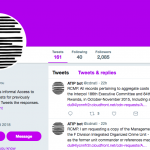Honey, the pandemic shrunk transparency
In these pandemic months, no one, not the public or Parliament, is getting greater transparency.
Existing committees like the House of Commons Health Committee will be having a one shot quicker-than-usual partial viewing of some of the reacted pandemic documents. That’s only after the opposition parties outvoted the reigning Liberal minority government. But attempts at creating a new special committee to review and make more transparent government corruption practices was voted down, and even made into a non-confidence vote, hardly a vote of confidence for more openness.
As Globe and Mail columnist Campbell Clark put it, access to government information never has been, including during the pandemic, an essential service. Both Canada’s federal Procurement Minister Anita Anand and drug companies like Pfizer, made it seem the sky would fall in if you released basic vaccine pandemic contract information.
But the opposition did concede that giving the government more time to delay releasing vaccine contracts from 15 to 35 days was “reasonable”, and that the government has a point in various broad exemptions.
But it does not help either that federal agencies are coming out with more “no record” responses.
So, for example, Canada Revenue Agency, who has seen the public reporting of potential violations of WE Charity’s mixing its profit-making ventures with its charitable ones or its questionable moving around of its real estate assets, writes in response to a request that “no records” exist. Se we’re led to believe not a single CRA briefing or memo was devoted to the charity’s’ potential misuses of its charitable tax status and not one note was prepared on the numerous media stories about such mixing of assets.
Ditto for any records existing at the Privy Council Office about the contracts, arrangements, agreements Prime Minister Trudeau has with his new special advisor, former bank governor Mark Carney.
Meanwhile, when it comes to the Union of National Defence Employees wanting to know about costs and audit performances of the private contractors doing work at military bases, it’s unavailable to them according to National Defence because it’s outside access to information act coverage. There’s no right to know there either.
Trudeau’s announcement that his government wants a fluffy fall economic publication update with fewer facts and analysis about future government spending plans and debt and deficit drops the transparency index even further.
More and more, government published data is thin on details, which is now legally allowed, thanks to the amended access to information act where the government can create one-sided “pro-active” dumbed-down-narrow disclosures.
Dean Beeby, now an independent journalist, writes in the Ottawa Citizen, that instead of accepting these extra barriers to access which amount to a near collapse of the already weak access-to-information act, we can do better, much better. This includes, according to feedback Beeby received, to release timelines of essential data, including health costs, within 15 days and to not allow oral decision-making anymore. All those excessive redactions from commercial and cabinet confidences to the “notorious” policy advice need adult supervision with proven injuries and no more than a three year shelf-life.
As Beeby notes, the current Treasury Board review of the Access to Information Act is the 14th one. It’s a bit rich to put the agency responsible for bureaucratic inaction and intent on preventing broad disclosure reforms in charge of the review.
Document counts, surveillance of users, gagging employees, partisanship considerations, resource and administrative barriers, and plain resistance never will lead to moving transparency forward. The government simply wants to build up more immunity to responding fully and quickly to the public’s information needs.
It’s time for the government to take off the mask that disguises and robs us of our public’s right to know. Trustworthy and revitalized government requires effective access and more public scrutiny.
This article was originally published by the Hill Times and appears here with the author’s permission.
Ken Rubin is a long-time investigative researcher and proponent of transparency and human rights. He is reachable at kenrubin.ca.




